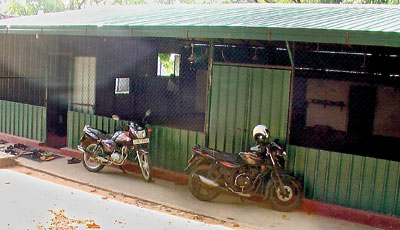Amid claims and counterclaims, deadlines and discussions, the crisis awaits speedy solution
By Wasantha Ramanayake
 As the dispute over the mosque in Dambulla continues for the second week amid local and international media focus, a solution to it may come in the coming days with the intervention of President Mahinda Rajapaksa.
As the dispute over the mosque in Dambulla continues for the second week amid local and international media focus, a solution to it may come in the coming days with the intervention of President Mahinda Rajapaksa.
The President returned to the country on Friday after a five-day official visit to South Korea. During his stay in South Korea, Prime Minister D. M. Jayaratne tried to solve the dispute. But his attempts created a fresh controversy with Minister A. H. M. Fowzie and Western Province Governor Alavi Moulana denying his claim that they took part in a meeting where a decision was taken to shift the mosque to another place.
Attack on Dambulla Mosque
By Latheef Farook
The attack to demolish the Dambulla Khairiya Jumah Masjd Friday 20 April 2012 is not the “beginning” as stated by the pro government Buddhist monk who led the mob to attack the mosque in an act of sheer lawlessness.
This unfortunate incident in fact is the latest in the series of provocations unleashed to set the Muslims, who pose no threat or nuisance to anyone, against Sinhalese. Most Sinhalese, especially those in the Dambulla area, distanced themselves from this vandalism stating that “we are living in peace with Muslims and this was done by people brought from outside”.
 Following a protracted and violent civil war that lasted for more than 26 years costing thousands of lives and destruction of property, it would have been natural to assume that Sri Lanka would set itself on the path of healing through national reconciliation with all its peoples; Buddhists, Tamils and Muslims.
Following a protracted and violent civil war that lasted for more than 26 years costing thousands of lives and destruction of property, it would have been natural to assume that Sri Lanka would set itself on the path of healing through national reconciliation with all its peoples; Buddhists, Tamils and Muslims.